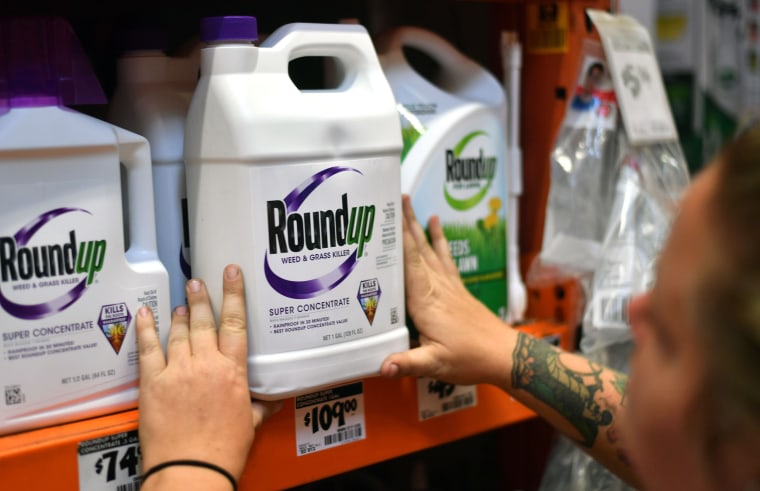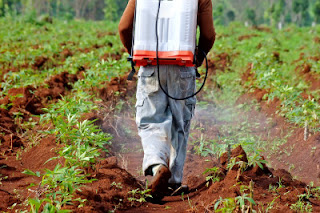Judge allows lawsuits claiming Monsanto weed killer Roundup causes cancer to go forward
The company that makes Roundup, Monsanto, has strongly denied that there is any connection between their product and cancer.
by Associated Press
July 11, 2018
 Hundreds of lawsuits have alleged that Roundup causes cancer.Josh Edelson / AFP - Getty Images
Hundreds of lawsuits have alleged that Roundup causes cancer.Josh Edelson / AFP - Getty ImagesSAN FRANCISCO, CA — Hundreds of lawsuits alleging Roundup weed killer causes cancer cleared a big hurdle this week when a federal judge ruled that cancer victims and their families could present expert testimony linking the herbicide to non-Hodgkin's lymphoma.
U.S. District Judge Vince Chhabria said evidence that the active ingredient in Roundup — glyphosate — can cause the disease seemed "rather weak." Still, the opinions of three experts linking glyphosate and non-Hodgkin's lymphoma were not "junk science" that should be excluded from a trial, the judge ruled on Tuesday.
The lawsuits say agrochemical giant Monsanto, which makes Roundup, long knew about the cancer risk but failed to warn people. The ruling allows the claims to move forward, though the judge warned it could be a "daunting challenge" to convince him to allow a jury to hear testimony that glyphosate was responsible for individual cancer diagnoses.
Many government regulators have rejected a link between cancer and glyphosate. Monsanto has vehemently denied such a connection, saying hundreds of studies have established that the chemical is safe.
The company is facing hundreds of lawsuits in state and federal courts that claim otherwise. Chhabria is presiding over more than 400 of them.
A separate trial is under way in San Francisco in a lawsuit by a school groundskeeper dying of non-Hodgkin's lymphoma — the first case a jury has heard alleging Roundup caused cancer.
In response to Chhabria's ruling, Monsanto Vice President Scott Partridge noted the judge excluded some of the plaintiffs' experts and called the opinions of those he is allowing to testify "shaky."
"Moving forward, we will continue to defend these lawsuits with robust evidence that proves there is absolutely no connection between glyphosate and cancer," Partridge said in a statement. "We have sympathy for anyone suffering from cancer, but the science clearly shows that glyphosate was not the cause."
Michael Baum, an attorney for the plaintiffs, said he was still reviewing the ruling but was pleased the judge rejected Monsanto's effort to have the lawsuits thrown out.
"We look forward to taking the next step — getting our clients their day in court," he said in a statement.
The judge wanted to determine whether the science behind the claim that glyphosate can cause non-Hodgkin's lymphoma had been properly tested and met other requirements to be considered valid.
Chhabria spent a week in March hearing dueling testimony from epidemiologists. He peppered them with questions about potential strengths and weaknesses of research on the cancer risk of glyphosate.
Beate Ritz, an epidemiologist at the University of California, Los Angeles, testified for the plaintiffs that her review of scientific literature led her to conclude that glyphosate and glyphosate-based compounds such as Roundup can cause non-Hodgkin's lymphoma.
Ritz said a 2017 National Institutes of Health study that found no association between glyphosate and non-Hodgkin's lymphoma had major flaws.
Monsanto brought in its own expert, Lorelei Mucci, a cancer epidemiologist at the Harvard T.H. Chan School of Public Health, who praised the 2017 study.
"When you look at the body of epidemiological literature on this topic, there's no evidence of a positive association between glyphosate and NHL risk," she said of non-Hodgkin's lymphoma.
In his ruling Tuesday, the judge said Ritz and Mucci could both testify before a jury.
Monsanto developed glyphosate in the 1970s, and the weed killer is now sold in more than 160 countries. Farmers in California, the most agriculturally productive state in the U.S., use it on more than 200 types of crops. Homeowners use it on their lawns and gardens.
The herbicide came under increasing scrutiny after the France-based International Agency for Research on Cancer, which is part of the World Health Organization, classified it as a "probable human carcinogen" in 2015.
A flurry of lawsuits against Monsanto followed, and California added glyphosate to its list of chemicals known to cause cancer. Monsanto has attacked the international research agency's opinion as an outlier.
The Environmental Protection Agency says glyphosate is safe for people when used in accordance with label directions.
A federal judge in Sacramento has blocked California from requiring that Roundup carry a label stating that it is known to cause cancer, saying the warning is misleading because almost all regulators have concluded that there is no evidence glyphosate is carcinogenic









